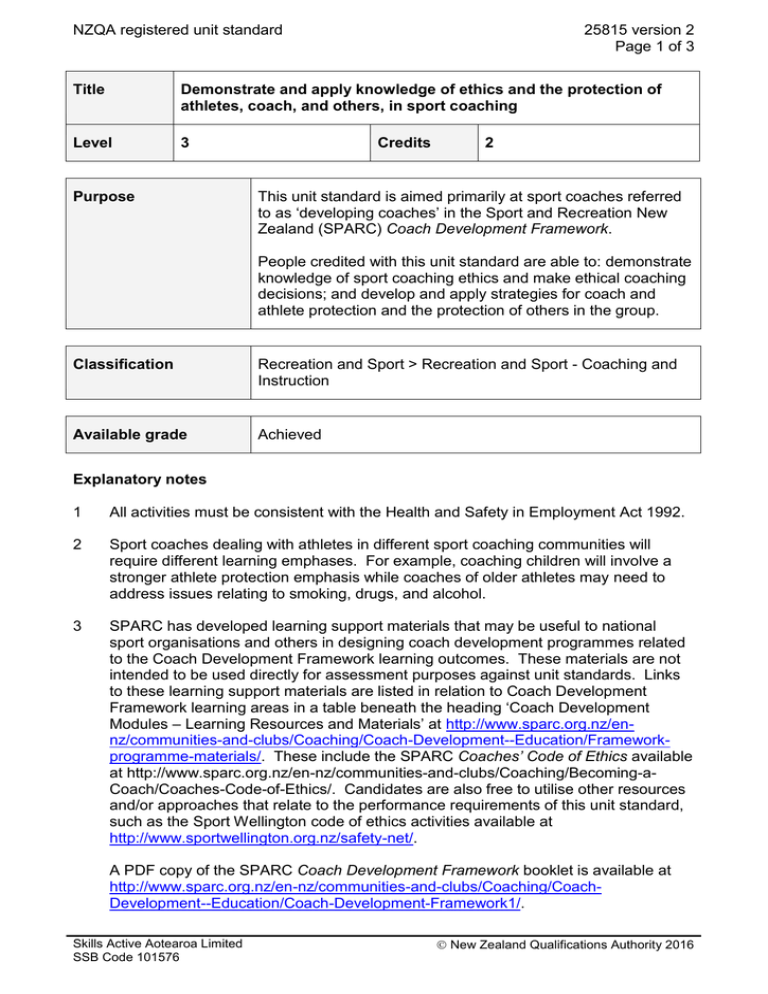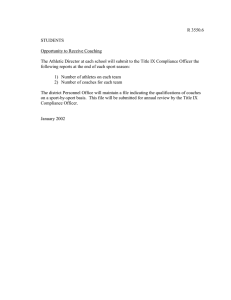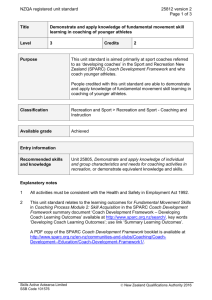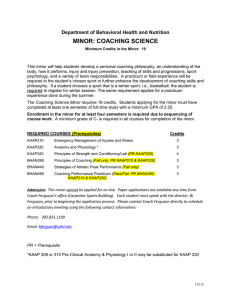NZQA registered unit standard 25815 version 2 Page 1 of 3
advertisement

NZQA registered unit standard 25815 version 2 Page 1 of 3 Title Demonstrate and apply knowledge of ethics and the protection of athletes, coach, and others, in sport coaching Level 3 Purpose Credits 2 This unit standard is aimed primarily at sport coaches referred to as ‘developing coaches’ in the Sport and Recreation New Zealand (SPARC) Coach Development Framework. People credited with this unit standard are able to: demonstrate knowledge of sport coaching ethics and make ethical coaching decisions; and develop and apply strategies for coach and athlete protection and the protection of others in the group. Classification Recreation and Sport > Recreation and Sport - Coaching and Instruction Available grade Achieved Explanatory notes 1 All activities must be consistent with the Health and Safety in Employment Act 1992. 2 Sport coaches dealing with athletes in different sport coaching communities will require different learning emphases. For example, coaching children will involve a stronger athlete protection emphasis while coaches of older athletes may need to address issues relating to smoking, drugs, and alcohol. 3 SPARC has developed learning support materials that may be useful to national sport organisations and others in designing coach development programmes related to the Coach Development Framework learning outcomes. These materials are not intended to be used directly for assessment purposes against unit standards. Links to these learning support materials are listed in relation to Coach Development Framework learning areas in a table beneath the heading ‘Coach Development Modules – Learning Resources and Materials’ at http://www.sparc.org.nz/ennz/communities-and-clubs/Coaching/Coach-Development--Education/Frameworkprogramme-materials/. These include the SPARC Coaches’ Code of Ethics available at http://www.sparc.org.nz/en-nz/communities-and-clubs/Coaching/Becoming-aCoach/Coaches-Code-of-Ethics/. Candidates are also free to utilise other resources and/or approaches that relate to the performance requirements of this unit standard, such as the Sport Wellington code of ethics activities available at http://www.sportwellington.org.nz/safety-net/. A PDF copy of the SPARC Coach Development Framework booklet is available at http://www.sparc.org.nz/en-nz/communities-and-clubs/Coaching/CoachDevelopment--Education/Coach-Development-Framework1/. Skills Active Aotearoa Limited SSB Code 101576 New Zealand Qualifications Authority 2016 NZQA registered unit standard 4 25815 version 2 Page 2 of 3 Definitions Emotional abuse may include – mental abuse, verbal abuse, bullying, undue parental pressure. Neglect, in the context of this unit standard, refers primarily though not exclusively to putting athletes physically and/or emotionally at risk through failure to create a safe environment. Not checking or using unsafe sport equipment and inadequate monitoring of practice activities where bullying may be occurring are examples of such neglect. Organisational requirements refer to policy and procedures of the sport club and/or other organisation with which the team or group of athletes is associated, and include compliance with any applicable legislation, standards, and codes. Protection means providing a safe physical environment and freedom from personal abuse (verbal, physical or emotional), sexual or racial harassment, and being alert to abuse directed at them by other sources while in the coach’s care. Sport coaching community refers to a coaching community (of athletes) primarily, but not exclusively, recognised in terms of age and/or stage by SPARC in the Coach Development Framework and/or by a national sport organisation. Outcomes and evidence requirements Outcome 1 Demonstrate knowledge of sport coaching ethics and make ethical coaching decisions. Evidence requirements 1.1 Description of key elements of own role and responsibilities to athletes is consistent with the SPARC Coaches’ Code of Ethics or the coaching code for own sport. Range 1.2 respect for others, integrity, positive role modelling, professional responsibilities, providing a quality service, providing a safe environment, protection from personal abuse. Ethical decisions are made for sport coaching consistent with the SPARC Coaches’ Code of Ethics or the coaching code for own sport. Range may relate to but is not limited to – dealing with athletes, dealing with (non-athlete) others, practices, competition, off-field interactions, travel. Outcome 2 Develop and apply strategies for coach and athlete protection and the protection of others in the group. Evidence requirements 2.1 Types of protection required for coach, athlete and others in the group are described in terms of the SPARC Coaches’ Code of Ethics or coaching code for own sport. Skills Active Aotearoa Limited SSB Code 101576 New Zealand Qualifications Authority 2016 NZQA registered unit standard 2.2 25815 version 2 Page 3 of 3 Protection from abuse of athlete, coach and others in the group is described in terms of its potential occurrence in sport coaching related activities. Range physical abuse, neglect, emotional abuse, sexual abuse. 2.3 Strategies developed to handle situations relating to coach and athlete protection and the protection of others in the group are in accordance with organisational requirements, and the SPARC Coaches’ Code of Ethics or the coaching code for own sport. 2.4 Application of strategies in sport coaching related activities minimises risk to coach, athletes, and others in the group. Planned review date 31 December 2012 Status information and last date for assessment for superseded versions Process Version Date Last Date for Assessment Registration 1 16 April 2010 31 December 2012 Rollover and Revision 2 20 May 2011 N/A Consent and Moderation Requirements (CMR) reference 0099 This CMR can be accessed at http://www.nzqa.govt.nz/framework/search/index.do. Please note Providers must be granted consent to assess against standards (accredited) by NZQA, before they can report credits from assessment against unit standards or deliver courses of study leading to that assessment. Industry Training Organisations must be granted consent to assess against standards by NZQA before they can register credits from assessment against unit standards. Providers and Industry Training Organisations, which have been granted consent and which are assessing against unit standards must engage with the moderation system that applies to those standards. Requirements for consent to assess and an outline of the moderation system that applies to this standard are outlined in the Consent and Moderation Requirements (CMRs). The CMR also includes useful information about special requirements for organisations wishing to develop education and training programmes, such as minimum qualifications for tutors and assessors, and special resource requirements. Comments on this unit standard Please contact Skills Active Aotearoa Limited info@skillsactive.org.nz if you wish to suggest changes to the content of this unit standard. Skills Active Aotearoa Limited SSB Code 101576 New Zealand Qualifications Authority 2016




